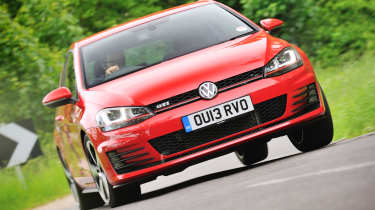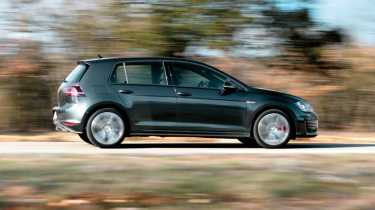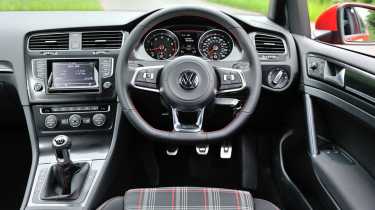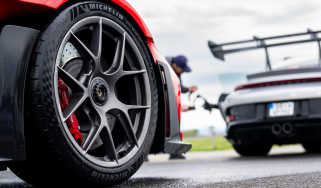Used VW Golf GTI (Mk7, 2013 - 2020) review – still the best hot hatch all-rounder
It might not have burned quite as brightly as Renault Sport Meganes and Honda Civic Type Rs, but the Mk7 Golf GTI is all the hot hatch most could ever need
Ask most enthusiasts what car to buy and you can just about guarantee that a Volkswagen Golf will feature highly in the list of potential purchases. And with good reason – it just does so many things well and very few badly. No matter which generation you’re interested in the answer will be a Golf. If you want something that’s a bit faster and a bit more engaging the answer will be a Volkswagen Golf GTI. Yes, the GTI might not be the most tactile of hot hatches, or the fastest, or the most stylish, but as an all-round ownership prospect it really has very few peers.
Debate will rage over which generation of Golf GTI is the best with some preferring the old school feel of a Mk1 or a Mk2 while others might opt for a more modern and well-rounded machine. Most agree that the Mk4 was a bit of duffer but the Mk5 was a return to form while the Mk6 that followed it was a case of VW just playing it a little too safe – it didn’t move the game along much, if at all. So how does the Mk7 rank in the all-time list? Pretty highly if you ask us, delivering excellent performance and a chassis that’s poised and fluid. It might lack the ultimate dynamism that made contemporaries such as the Civic Type R or the Renault Sport Megane such fun, but as an everyday all-rounder that can still entertain it’s a superb package.
VW Golf GTI (Mk7) review
When it was launched in 2013 the Mk7 Golf GTI was available in two power levels from the factory: both models using a 2-litre turbocharged four-cylinder petrol engine, producing 217bhp in the GTI and 227bhp in the GTI Performance. Both produced 257lb ft of torque and were available in either three-door or five-door form and as a six-speed manual or twin-clutch DSG. The base GTI started at £25,845 – up only £195 from the previous Mk6 Golf GTI – but most enthusiasts wanted the GTI Performance. For a £980 premium, buyers received the extra power as well as a limited-slip differential and larger ventilated front and rear brake discs: 340mm front and 310mm rear (up from 312mm and 300mm respectively).
More reviews
When compared to some of its contemporary rivals the GTI looked like it was a little short of firepower with the Renault Sport Megane 265 offering 261bhp for £25,255 while the Ford Focus ST was even cheaper at £21,995 and delivered 247bhp. As is often the way the raw figures didn’t tell the whole story and even the standard 217bhp version felt very quick on the road even if its 0-62mph time of 6.5sec wasn’t a top of the class figure. The Performance Pack shaved 0.1sec from the 0-62mph time and added 2mph to the standard car’s 153mph maximum.
As to be expected there was some tweaking of the GTI’s headline figures during its lifetime with the standard GTI receiving a power boost of 10bhp in 2017 while the Performance Pack’s output swelled to 242bhp. For the last couple of years of production only the hotter model was available with the lower-powered car being quietly dropped.
If you’ve not driven a last-generation Golf GTI, we’d suggest you do, especially if you're feeling alienated by the Mk8. In its seventh generation the Golf’s ride and handling are to the highest standard we've yet experienced. The MQB platform on which it is based is always a good start, but there is something about the Mk7 Golf’s set up that makes it a more entertaining car to drive than other VW Group MQB-based models, including the car that replaced it.
The suspension itself is by MacPherson struts at the front and a multi-link set-up at the rear and compared to the standard hatch the GTI’s suspension is 15mm lower. The set-up is nothing like as stiff as some rivals, being firm, but incredibly well controlled, with impeccable wheel control and a fluid primary and secondary ride, even on the larger 19-inch wheel option.
The Mk7’s interior is a quality set up with excellent materials and a feeling of durability permeating the cabin. The standard seats are comfy and supportive while the optional sports seats grip in all the right places without being any less comfortable. If you need the extra practicality that rear doors offer, the five-door GTI can oblige. And you’re not alone. The five-door model accounted for about 70 per cent of all GTI sales. The GTI is virtually identical to the standard Golf in terms of size, so it's just as practical as the standard car. There's a generous 380-litre boot with an adjustable floor, making it better for luggage than the contemporary Ford Focus ST, but it has less cargo capacity than the Honda Civic Type R and significantly less than a Skoda Octavia vRS.
With the rear seats folded flat the load area becomes even more practical – it's completely flat and the low lip makes it easy to get things in and out. The rear seats are definitely large enough for most adults and there are plenty of storage cubbies around the cabin.
There were no major mechanical revisions during the Mk7’s life, but the facelift in 2017 (often referred to as the Mk7.5) heralded new bumpers, LED lights front and back and a raft of driver assistance systems and infotainment technologies. The touchscreens were all larger, with the optional Discover Pro version now featuring a vast 9.2-inch display. That meant the icons were bigger than before which made them easier to tap when on the move, but the deletion of the rotary knobs for volume and map zoom control is a backwards step and you might find the system in the pre-facelift is easier to live with day to day.
What we said
‘Sometimes British B-roads can be the undoing of a car, and sometimes they can be the making of it. With the GTI it’s the latter. The bumps, humps and general rough and tumble of broken tarmac reveal just how talented the chassis is, as it tracks the road in a display of beautifully controlled damping.
‘The natural instinct is to put the car into its Sport setting and it certainly feels well resolved and not too harsh, which is impressive. However, if you go into the Driver Profile Selection screen and tap on the ‘Individual’ setting then you can retain the Sport settings for steering, engine, ESP etc but knock the suspension back to Normal. Now you get a little more roll and a tiny bit of float over the bumps, which then lets you get the car moving around a touch more into and through corners, which is lovely. The balance remains neutral, but it’s so easy to place thanks to that stiff MQB platform that you can really throw it around.’ – Henry Catchpole, standard Mk7 GTI review, 2013.
‘Time to up the pace. ACC in Sport means stiffer damping, heavier steering, better throttle response and looser ESP. The chassis tenses noticeably and through a fast chicane, the GTI remains flat and agile. Indeed, the speed carried through quicker corners is eye-opening – even acting the hooligan and suddenly lifting off does nothing but tighten the line. Again, this is deeply impressive – grip across the rear axle is secure and the GTI’s stability superb. The Mk7 GTI certainly feels much happier over mid-corner bumps than the Mk6 GTI.
> Volkswagen Golf GTI Clubsport S (2016, Mk7): an ultra-exclusive hot hatch great
‘The new car can make quite extraordinary progress on the road, the innate sense of solidity encouraging harder and more aggressive driving. The brakes never fade on track or road, the chassis never shudders or shivers over rough tarmac, and the chassis’ overall poise is nothing other than settled and contained.’ – Nick Trott, Performance Pack Mk7 GTI, 2013.
‘This Mk7.5 Golf GTI drives exactly the same as the previous version, which means it’s perhaps the most refined and civilised hot hatch on sale. It’s also very competent on back roads without being truly thrilling in the manner of the Renaultsport Megane or the, admittedly more expensive, Ford Focus RS.
‘Equipped with VW's adaptive dampers (called Dynamic Chassis Control) there’s a suppleness to the GTI's ride quality that makes it an effortless day-to-day and long-distance machine. Even in the normal damper mode there’s enough control and precision that you can really commit to a twisting road. Keen drivers would do well to specify the Performance package, which adds a mechanical LSD. Without it, the GTI can feel scruffy and unsettled away from second gear corners, even in the dry.
> Used Volkswagen Golf GTI TCR (2019) review – Mk7’s soft sendoff beats any Mk8
‘The steering is crisp and direct, giving a clear sense of connection to the front axle, which helps you to easily find the limit of grip. When that limit does arrive, the GTI is very secure and forgiving. In fact, it’s that total, boundless stability that makes the Golf such an effortless car to drive quickly, but it also means the GTI doesn’t deliver the same degree of excitement that a more aggressive hot hatch can serve up.’ – Dan Prosser, Mk7 GTI, 2017.
What to pay and buying guide
As befits its all-rounder tag the Mk7 Golf GTI should be an excellent everyday machine which shouldn’t give you too many unexpected trips to the garage for unscheduled repairs. Economy when cruising is pretty decent, expect an average of around 30mpg – use the performance and that will drop significantly. Insurance might be a problem if you’re young or have a spotty driving history, but no more so than any of its contemporaries.
The good news is that there’s a Mk7 GTI for just about every budget with early standard model cars with mileages around the 100k mark starting at about £7500. If you’re after a Performance Pack version then you’ll need an extra £1000 to join the club. From there you can spend up to around the £20k mark for your Mk7 GTI with the very last of the Performance Pack models with low mileages just dipping into the low £20ks.
It might be a VW but there are still a few points to look out for on the Mk7 GTI with the old advertising tag line ‘If only everything in life was as reliable as a Volkswagen’ not being 100 per cent fact. For a car that’s praised for the quality and solidity of its interior fixtures and fittings as time goes on the Mk7 GTI has developed a little bit of a reputation for creaks and rattles from the door panels and the sunroof. The latter item isn’t immune to leaking either.
The 2-litre turbocharged motor does seem to be pretty durable with the cam chain tensioner problem that affected the Mk6 GTI seemingly resolved for its younger sibling. Keep an ear out for any odd noises though. There have been reports of failed turbos on earlier models and all versions of the engine have a bit of a drinking problem when it comes to oil consumption. It’s not terrible, but you do need to keep your eye on the level between services. If you’ve got the bonnet open look out for coolant leaks, especially from the water pump and thermostat housing. Damp in the footwells could point to a failed heater matrix which is a time-consuming repair. If you’re looking at a DSG model check whether the oil and filter has been changed – every 40k miles for the earlier cars and 80k miles for the post facelift Mk7.5.








